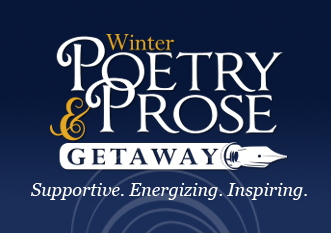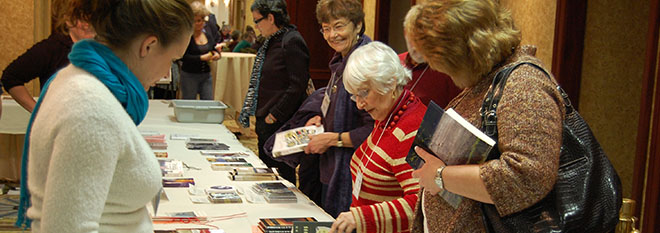This entry is part of Getaway Reads, a weekly e-mail series curated by Stephanie Cawley that features the writing of the Winter Poetry & Prose Getaway faculty.
Crossing the Milky Way
by Anndee Hochman
Here is the baby: smell of sourdough, brown butter, mown wheat, warm earth. Moist anemone hands, the toes you nibble as if they are nubs of maple sugar. Behind the closed bedroom door, talk ripples up from downstairs. You rock in the hand-painted chair.
Here is the hunger, legible in her wide blue eyes, garnet blossom of a mouth, the cry that bubbles from belly to breath. “Shh…” you murmur. Now that you are a mother, you know about murmuring. You lift your shirt, ease stretchy lace from your left breast. “Mmm…come here, sweetie.” The baby latches, an open-mouth kiss, a perfect seal. Her suck rhythmic, insistent: she is all appetite.
Here is the rub: It won’t last long. The warm crescent of her body, the pleated neck and kiwi cheek, the steady pull of her gums, working and working as if to draw your own hurrying heart from its cage.
I did it only a few times and always with a sense of transgression. Always with the door closed. Downstairs, among in-laws and friends, I could be glib; passing our wailing daughter to Elissa, I quipped, “Sorry, kid, I’ve got the hardware, but not the software.” The company laughed. Elissa was already reaching under her shirt, deftly unsnapping her nursing bra. I sat back down, empty-handed. Jealousy bit my belly like a cramp.
Upstairs, it was a different story: half magical thinking, half willful trespass. Maybe I’d lactate spontaneously, out of sheer contiguity and love, milk and honey bubbling from the desert dunes. I’d heard of a lesbian who did that—found her breasts seeping milk the day her girlfriend and the girlfriend’s two baby sons moved into her home. And I’d watched another friend nurse her adopted son, a plastic box of formula draped around her neck, a tiny tube snaking from the box to her nipple and the baby sucking on both—flesh and straw—in an attempt to bring on lactation.
At the time, the contraption struck me as bizarre, contrived, even a little desperate. Adopting a baby just isn’t the same as squeezing one out of your body; why try to pretend it is? Besides, nursing (I preached quietly to myself) did not a mother make; my own mother nursed for only six weeks, and some women never do. I’d read those La Leche League brochures, and they struck me as overly zealous, the kind of pious propaganda that made women feel bad if they didn’t—or chose not to—measure up.
But that was before Sasha was born, when it was easier to preach than practice. She was small at birth, and in the first few days she dropped weight steadily until she hovered at five pounds, five ounces. Another fraction lost, the pediatrician cautioned, and she’d put her on formula. So Elissa nursed, and nursed, in a fever of worry and determination: I’ll be damned if this kid’s gonna get Similac. Sasha ate every hour and a half, so slowly it seemed she’d just finished one feeding before starting the next. I’d cradle her in my arms, gulping in the yeasty smell of her head, and she’d start mouthing O’s at my collarbone. It was time. Again. Every feeding felt like a referendum: Will the real mother please stand up? There would be no mistaking the imposter: Me, the one with no milk stains on her blouse.
Through nine months of expectation, I hadn’t looked pregnant. Now I didn’t even look like I was parenting. The baby spent most of her waking (and sleeping) hours barnacled to Elissa’s breast, with brief forays into the arms of grandparents, uncles and family friends who stopped by with pans of lasagna and boxes from Baby Gap. A colleague of Elissa’s phoned with congratulations and asked, “May I speak to the little mother?” I resisted the urge to snarl, “You’re talking to her—and she’s not so little!” I joked about needing to take a number in order to hold my own daughter, but at night, in our room, I hissed at Elissa, “After you nurse her, you have to hand her to me. It’s not fair that you get to cuddle her all night!” And Elissa would agree—of course, that’s only fair—then, at 3 or 4 a.m., she’d nurse herself and Sasha into a deep, immovable sleep, and I’d be alone again on my side of the bed.
I hadn’t bargained for this. We were lesbians, after all, two women who had had a baby, breaching social norms and biological destiny with one deft plunge of a semen-filled syringe. But biology trumped our most equitable intentions. “It’s the boob,” sighed one friend, watching her partner nurse their 18-month-old. “You can’t compete with the boob.” But it’s not just the boob. It’s everything the boob represents: nourishment, succor, self-sacrifice, pleasure, primal attachment. I loved Sasha so much my chest ached. Was this what engorgement felt like? Or was that my heart twisting in the face of an unwelcome news flash: that parenting and unrequited love had something painfully in common?
Eventually, I knew, Sasha would wean from Elissa’s breast. She’d learn to pinch Cheerios into her mouth and, before we knew it, she’d be seventeen, ordering linguine al pesto from an Italian menu and rolling her eyes at our utter uselessness. I remembered that I’d soothed my daughter through her 45-minute naming ritual with a pinky in her tiny, raspberry mouth, and that even Elissa wasn’t always able to console Sasha when she cried. Still, I hungered to know, just once, what it felt like to be the one—okay, the only one—who could give the kid exactly what she needed.
Our pediatrician, herself a lesbian and the biological mother of twin sons, had told it me it might be possible for me to lactate, if I trained with the breast pump two or three times a day in the six weeks prior to Sasha’s birth. I considered it. In the end, I wasn’t keen on spending an hour a day attached to an electric milking machine with no guarantee I’d produce even one potable drop.
Still, there were those nights I took my subversive seat in the nursing rocker and lifted the bra from my breast. Maybe this time, desire would transmute into milk and, magically, we’d close the circle of survival: You need, I give, you grow. I’d settle for being a human pacifier, rocking there for a few contented moments until Sasha realized the tap was dry.
It never lasted long. My daughter was no fool. I’d carry her down to the happy clamor of the dining room, her face scrunched and reddening and my own, I imagined, flushed with guilt and regret. “I’m sorry,” I whispered as I handed her over—not only for the missing milk, but for all the ways I would certainly come up short in the coming years, all the hungers I would no doubt fail to fill.
© Anndee Hochman. Originally published in Literary Mama, 2012.
+ + + + + + + + + +
Anndee Hochman writes feature articles, profiles and essays about education, health and the wide, quirky spectrum of family and community life, including issues of adoption, foster care, reproductive technology, same-sex couples and intentional community. In addition to her regular pieces in the Philadelphia Inquirer, her work has appeared in O, the Oprah Magazine, Health, Working Mother, Marie Claire and online in Literary Mama. She is the author of Anatomies: A Novella and Stories (Picador 2000) and Everyday Acts & Small Subversions: Women Reinventing Family, Community and Home (The Eighth Mountain Press, 1994). For the past 20 years, Anndee has taught writing to children, teens and adults in a variety of settings, including schools, senior centers and a small fishing village on Mexico’s Pacific coast. Her website is anndeehochman.com.
+ + + + + + + + + +
Want to study with Anndee Hochman? At the 2014 Winter Poetry & Prose Getaway, Anndee will lead The Heart and Craft of Memoir workshop.
+ + + + + + + + + +
Advance your craft and energize your writing at the Winter Poetry & Prose Getaway. Enjoy challenging and supportive sessions, insightful feedback and an encouraging community. Learn more.





Andee, that was simply gorgeous, like a melody that wants to stay in your head. Even bio moms can relate. I passed into the stage where my daughter had a child and I knew I would never have another. Nursing is a pain and so is menstruating, but even the sight of tampons in her bathroom makes me feel like an empty theater after the play has ended…I don’t yet have an answer to what will replace that performance, though I’m determined to find one.